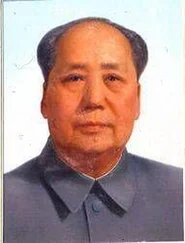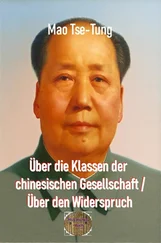Tse-tung Mao - The Little Red Book
Здесь есть возможность читать онлайн «Tse-tung Mao - The Little Red Book» весь текст электронной книги совершенно бесплатно (целиком полную версию без сокращений). В некоторых случаях можно слушать аудио, скачать через торрент в формате fb2 и присутствует краткое содержание. Жанр: Политика, на английском языке. Описание произведения, (предисловие) а так же отзывы посетителей доступны на портале библиотеки ЛибКат.
- Название:The Little Red Book
- Автор:
- Жанр:
- Год:неизвестен
- ISBN:нет данных
- Рейтинг книги:5 / 5. Голосов: 1
-
Избранное:Добавить в избранное
- Отзывы:
-
Ваша оценка:
- 100
- 1
- 2
- 3
- 4
- 5
The Little Red Book: краткое содержание, описание и аннотация
Предлагаем к чтению аннотацию, описание, краткое содержание или предисловие (зависит от того, что написал сам автор книги «The Little Red Book»). Если вы не нашли необходимую информацию о книге — напишите в комментариях, мы постараемся отыскать её.
The Little Red Book — читать онлайн бесплатно полную книгу (весь текст) целиком
Ниже представлен текст книги, разбитый по страницам. Система сохранения места последней прочитанной страницы, позволяет с удобством читать онлайн бесплатно книгу «The Little Red Book», без необходимости каждый раз заново искать на чём Вы остановились. Поставьте закладку, и сможете в любой момент перейти на страницу, на которой закончили чтение.
Интервал:
Закладка:
"Rectify the Party's Style of Work" (February 1, 1942), Selected Works, Vol. III, p. 50.*
Another point that should be mentioned in connection with inner-Party criticism is that some comrades ignore the major issues and conhne their attention to minor points when they make their criticism. They do not understand that the main task of criticism is to point out political and organizational mistakes. As to personal shortcomings, unless they are related to political and organizational mistakes, there is no need to be overcritical or the comrades concerned will be at a loss as to what to do. Moreover, once such criticism develops, there is the great danger that within the Party attention will be concentrated exclusively on minor faults, and everyone will become timid and overcautious and forget the Party's political tasks.
"On Correcting Mistaken Ideas in the Party" (December 1929), Selected Works, Vol. I, pp. 111-12.*
In inner-Party criticism, guard against subjectivism, arbitrariness and the vulgarization of criticism; statements should be based on facts and criticism should stress the political side.
Ibid ., p. 112.*
Inner-Party criticism is a weapon for strengthening the Party organization and increasing its hghting capacity. In the Party organization of the Red Army, however, criticism is not always of this character, and sometimes turns into personal attack. As a result, it damages the Party organization as well as individuals. This is a manifestation of petty-bourgeois individualism. The method of correction is to help Party members understand that the purpose of criticism is to increase the Party's fighting capacity in order to achieve victory in the class struggle and that it should not be used as a means of personal attack.
Ibid ., p. 110.
If we have shortcomings, we are not afraid to have them pointed out and criticized, because we serve the people. Anyone, no matter who, may point out our shortcomings. If he is right, we will correct them. If what he proposes will benefit the people, we will act upon it.
"Serve the People" (September 8, 1941), Selected Works, Vol. III, P. 227.
As we Chinese Communists, who base all our actions on the highest interests of the broadest masses of the Chinese people and who are fully convinced of the justice of our cause, never balk at any personal sacrifice and are ready at all times to give our lives for the cause, can we be reluctant to discard any idea, viewpoint, opinion or method which is not suited to the needs of the people? Can we be willing to allow political dust and germs to dirty our clean faces or eat into our healthy organisms? Countless revolutionary martyrs have laid down their lives in the interests of the people, and our hearts are filled with pain as we the living think of them - can there be any personal interest, then, that we would not sacrifice or any error that we would not discard?
"On Coalition Government" (April 24, 1945), Selected Works, Vol. III, p. 317.*
We must not become complacent over any success. We should check our complacency and constantly criticize our shortcomings, just as we should wash our faces or sweep the floor every day to remove the dirt and keep them clean.
"Get Organized!" (November 29, 1943), Selected Works, Vol. III. p. 160.*
As for criticism, do it in good time; don't get into the habit of criticizing only after the event.
On the Question of Agricultural Co-operation (July 31, 1955), 3rd ed., p. 25.
Taught by mistakes and setbacks, we have become wiser and handle our affairs better. It is hard for any political party or person to avoid mistakes, but we should make as few as possible. Once a mistake is made, we should correct it, and the more quickly and thoroughly the better.
"On the People's Democratic Dictatorship" (June 30, 1949), Selected Works, Vol. IV, p. 422.
28. COMMUNISTS
A Communist should have largeness of mind and he should be staunch and active, looking upon the interests of the revolution as his very life and subordinating his personal interests to those of the revolution; always and everywhere he should adhere to principle and wage a tireless struggle against all incorrect ideas and actions, so as to consolidate the collective life of the Party and strengthen the ties between the Party and the masses; he should be more concerned about the Party and the masses than about any individual, and more concerned about others than about himself. Only thus can he be considered a Communist.
"Combat Liberalism" (September 7, 1937), Selected Works, Vol. II, p. 33.*
Every comrade must be brought to understand that the supreme test of the words and deeds of a Communist is whether they conform with the highest interests and enjoy the support of the overwhelming majority of the people.
"On Coalition Government" (April 24, 1945), Selected Works, Vol. III, p. 316.*
At no time and in no circumstances should a Communist place his personal interests first; he should subordinate them to the interests of the nation and of the masses. Hence, selfishness, slacking, corruption, seeking the limelight, and so on, are most contemptible, while selflessness, working with all one's energy, whole-hearted devotion to public duty, and quiet hard work will command respect.
"The Role of the Chinese Communist Party in the National War" (October 1938), Selected Works, Vol. II, p. 198.
Communists must be ready at all times to stand up for the truth, because truth is in the interests of the people; Communists must be ready at all times to correct their mistakes, because mistakes are against the interests of the people.
"On Coalition Government" (April 24, 1945), Selected Works, Vol. III, p. 315.
Communists must always go into the whys and wherefores of anything, use their own heads and carefully think over whether or not it corresponds to reality and is really well founded; on no account should they follow blindly and encourage slavishness.
"Rectify the Party's Style of Work" (February 1, 1942), Selected Works, Vol. III, pp. 49-50.
We should encourage comrades to take the interests of the whole into account. Every Party member, every branch of work, every statement and every action must proceed from the interests of the whole Party;
it is absolutely impermissible to violate this principle.
Ibid ., p. 44.
Communists should set an example in being practical as well as far-sighted. For only by being practical can they fulfil the appointed tasks, and only far-sightedness can prevent them from losing their bearings in the march forward.
"The Role of the Chinese Communist Party in the National War" (October 1938), Selected Works, Vol. II, p. 198.
Communists should be the most farsighted, the most self-sacrificing, the most resolute, and the least prejudiced in sizing up situations, and should rely on the majority of the masses and win their support.
"The Tasks of the Chinese Communist Party in the Period of Resistance to Japan " (May 3, 1937), Selected Works, Vol. I, p. 274.*
Communists should set an example in study; at all times they should be pupils of the masses as well as their teachers.
"The Role of the Chinese Communist Party in the National War" (October 1938), Selected Works, Vol. II, p. 198.*
Every Communist working in the mass movements should be a friend of the masses and not a boss over them, an indefatigable teacher and not a bureaucratic politician.
Ibid .*
Communists must never separate themselves from the majority of the people or neglect them by leading only a few progressive contingents in an isolated and rash advance, but must take care to forge close links between the progressive elements and the broad masses. This is what is meant by thinking in terms of the majority.
Читать дальшеИнтервал:
Закладка:
Похожие книги на «The Little Red Book»
Представляем Вашему вниманию похожие книги на «The Little Red Book» списком для выбора. Мы отобрали схожую по названию и смыслу литературу в надежде предоставить читателям больше вариантов отыскать новые, интересные, ещё непрочитанные произведения.
Обсуждение, отзывы о книге «The Little Red Book» и просто собственные мнения читателей. Оставьте ваши комментарии, напишите, что Вы думаете о произведении, его смысле или главных героях. Укажите что конкретно понравилось, а что нет, и почему Вы так считаете.











